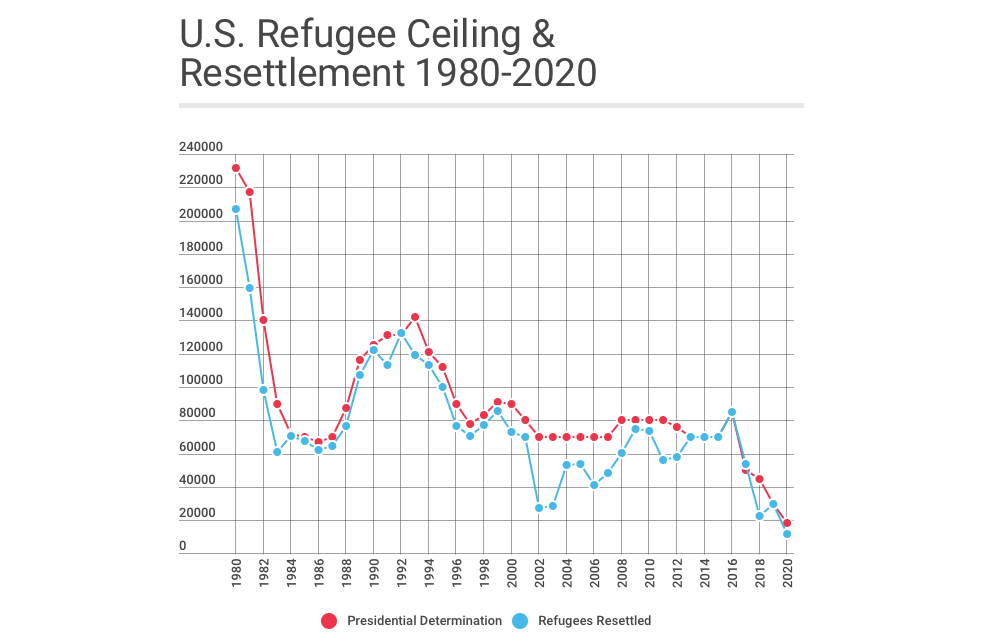A few weeks ago, Alexa and Grace wrote an article on the future of humanitarian issues under the Biden-Harris administration. They explained where the President-elect stands on major issues such as COVID-19, racial injustice, immigration policy, climate, and more.
The heading of Biden’s immigration plan on his campaign website reads “The Biden Plan for Securing Our Values As A Nation of Immigrants.” This is a clear and aggressive departure from Trump’s outwardly anti-immigration attitude and policies. In “The Biden Plan,” Trump is credited for the “Trump-created humanitarian crisis at our border”, while Biden is deemed “prepared” to deliver change and solutions on day one. But what can Biden realistically follow through on? “Day-One Promises” are a large part of presidential campaigns. Candidates prioritize relevant issues, and make promises to rally support (Check out this “Trump-O-Meter” tracking President Trump’s promises, and here’s one for Obama too). Let’s take a look at just a few Biden’s campaign promises on immigration.
Keeping families together
Under President Trump’s “Zero Tolerance” policy, all those crossing the border illegally, even asylum seekers and those with minor children, are considered criminals. Previously, illegal border crossings were rarely prosecuted. As they are deemed criminals, these individuals are required to be taken to federal criminal facilities, where children are not permitted. This resulted in the separation of up to 3,000 children from their parents. This number reflects those separated after the public announcement of the zero tolerance policy. These procedures had already been taking place for some time through a pilot program in El Paso, Texas. The true number of children separated is therefore unknown. Recently, it has come to light that the parents of 545 of these children cannot be found. Biden promises to “prioritize” the reunification of these children, and to end the prosecution of immigrant parents as an “intimidation tactic.” He has criticized President Trump’s “Zero Tolerance” policy, and promises to treat asylum seekers “with dignity,” and promises fair hearings.
Rescinding the Muslim Ban
According to the ACLU, in Jan. 2017, President Trump signed an executive order that banned “foreign nationals” from seven primarily Muslim countries for over 90 days, and suspended entry to Syrian refugees indefinitely.. Biden promises to rescind this outwardly xenophobic immigration policy, claiming that it “betrays our values,” is racists and anti-religious, and even serves as a “powerful terrorist recruiting tool.”
End the “National Emergency” at the Southern border
Biden plans to end funding for the border wall, and relocate it to “smart border enforcement efforts,” such as better screening infrastructure. Although he will not tear down the wall, he plans to cease all construction, and will end all land confiscations.
Ending the “Public Charge Rule”
The Public Charge Rule allows immigration officers to deny individuals visas based on their use of government services, such as Medicaid, Food Stamps, or public housing. The law reads that an “alien” is “inadmissible” if at the “time of application” they are “likely at any time to become a public charge.” This is extremely broad, and allows for widespread visa denial. The concept of public charge was originally created in 1882 to deny visas to individuals who were ill, criminal, or “unable to take care of him or herself without becoming a public charge.” However, President Trump’s public charge rule of 2019 codifies this old concept into law. Biden deems this to be “discriminatory” and “counter to our values as Americans,” and plans to reverse it.
Some goals are much more broad, and cannot be changed by immediate policy. These include ending the “mismanagement of the asylum system,” and “restoring sensible enforcement priorities.” The U.S. asylum system is set up in a way that each president sets a cap on the number of refugees admitted into the country per fiscal year. President Trump allowed 11,814 individuals to resettle in the United States in 2020. He was able to bring the number lower than ever before through an executive order that claimed protection against terrorism (also known as the “Muslim Ban”). As president, Biden seeks to set the cap at 125,000 individuals, and “raise it over time”.

Graph from National Immigration Forum
As to the restoration of “sensible enforcement,” the Biden-Harris administration promises to end workplace raids, and protect “sensitive locations,” such as hospitals, places of worship, and schools. “ICE raids” have become quite common in recent years. ICE cannot enter the homes of individuals, but they are able to raid schools, workplaces, churches, and medical buildings. Check out this map showing the spread of the 10,971 raids this year. Biden vows to curtail these raids, hopefully allowing for individuals to feel much safer in their day to day lives.
Biden claims to plan to do all of this within his first 100 days in office. However, with COVID-19 raging globally, and a stalled U.S. economy, it seems quite unlikely that there will be any kind of immediate action on immigration. However, this isn’t to say that immigration reform cannot happen under a Biden-Harris administration, but expecting “day one” results would be unrealistic.
It is important to acknowledge that our current strict, often xenophobic, and inhumane immigration policies and actions do not all stem from one president. The George W. Bush administration conducted massive workplace raids, such as the Postville Raid in 2008. The Obama administration was constantly berated by President Trump for “locking up kids in cages,” and it is quite true that there were “holding pens” at the border to compensate for overcrowding. Additionally, President Obama deported more individuals than any other president. As previously mentioned, the public charge concept was originated in 1882 to allow the U.S. to deny visas to highly liable individuals. U.S. immigration issues are not absolved with a change of hand in leadership, and we cannot expect that to be the case. Fortunately, when an administration makes promises, such as those made by Joe Biden, it is much easier for members of congress, activist groups, and individuals to hold them to such claims. This requires action, not complacency– if President-elect Joe Biden is held accountable, he will be much more likely to follow through on his promises.
- The United States Immigration System, and Where It Falls Apart - December 22, 2020
- What’s In Store for U.S. Immigration Policy? A Look at Immigration Under A Biden-Harris Administration - November 30, 2020
- 5 Things To Celebrate: Environmental Success Stories - November 11, 2020
